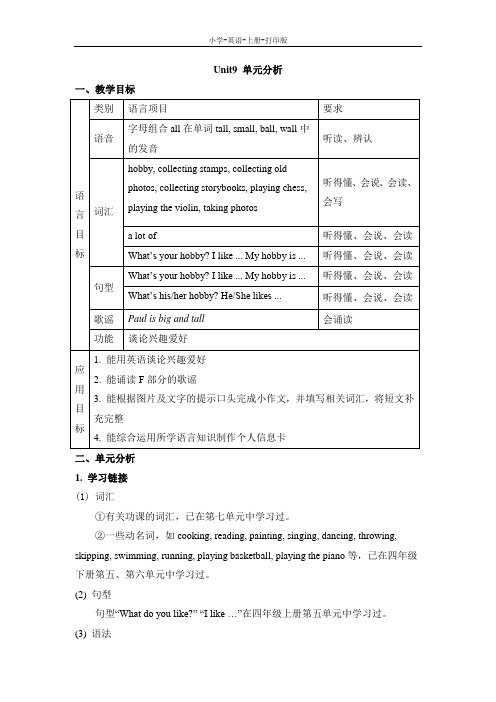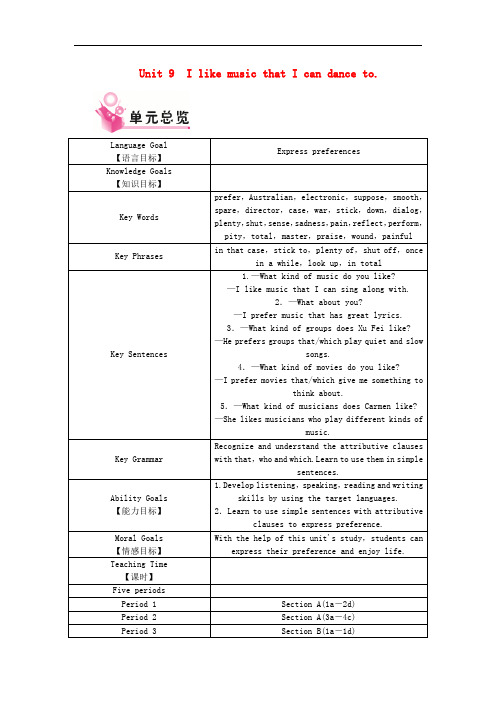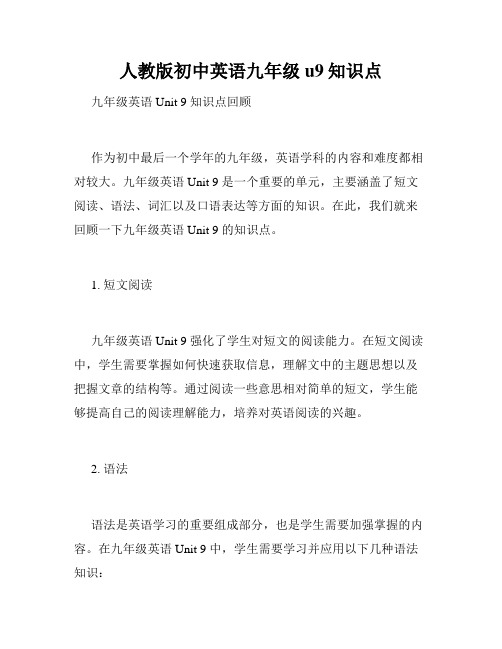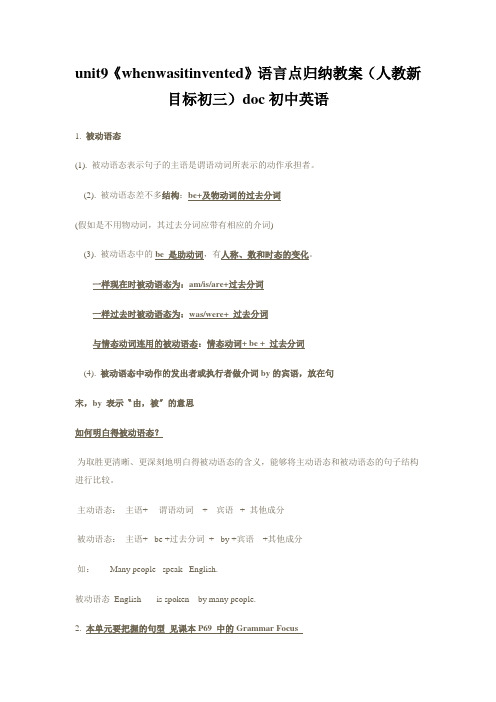unit9语言点分析
九年级英语Unit9第九单元教学设计带教学反思

九年级英语Unit9第九单元教学设计带教学反思九年级英语Unit 9第九单元教学设计带教学反思第1课时一、教材分析定语从句是本单元的语法要点,是在1-8单元已经对该语法知识有所渗透的前提下安排的。
本节课话题是让学生体会音乐在生活中无处不在,体会不同类型音乐的特点,学会热爱生活;能用简单的定语从句形式表述自己的观点。
通过本节的学习,增强学生对复合句的理解,提高其对此句式的应用能力。
二、三维目标1、知识目标:掌握本单元基本词汇,学会恰当的使用引导词that ,who2、能力目标1)掌握功能句“What kind of music do you like ? I like music that I can dance to . I love sing ers who can write their ownmusic.”2)能够自如地谈论自己所喜欢的音乐和音乐家。
3、情感目标:通过学生谈论对音乐和音乐家的好恶,从而使学生学会欣赏音乐的美。
三、教学重点1)本节课的教学重点是学会并掌握先行词为物或者人时,引导词“that ,who ”的使用方法。
2)“prefer …to…”的用法3)掌握有关音乐的词汇和相关的词组,能够比较流利地描述自己喜欢的音乐,运用功能句“What kind of music do you like ? I like music that I can dance to . I love singers who can write their own music.”四、教学难点定语从句运用五、教学策略采用任务型语言教学,实施情境教学法、小组合作探究法、情感激励法。
六、教学准备自制多媒体课件(PowerPoint);录音机(A tape recorder)七、教学环节1、课堂导入⑴ Warming up⑵ Discuss:Do you like music? What kind ofmusic do you know?⑶ There aremany kinds of music such as pop ,jazz, rock……. Let Sstalk about the kinds of music..(多媒体出示)⑷Let Ss read 1a. Explain the sentences:I prefermusic that has great lyrics=I like music that has great lyrics better.lyrics:the plural form is often used.Ask Ss topractice in pairs then make up a short passage using the four sentences on thescreen.2、课堂讲授Explain attributive clauses.定语从句:在复合句中修饰名词或者代词的从句叫做定语从句。
湘少版-英语-五年级上册-Unit9_单元分析

Unit9 单元分析
一、教学目标
二、单元分析
1. 学习链接
(1)词汇
①有关功课的词汇,已在第七单元中学习过。
②一些动名词,如cooking, reading, painting, singing, dancing, throwing, skipping, swimming, running, playing basketball, playing the piano等,已在四年级下册第五、第六单元中学习过。
(2) 句型
句型“What do you like?”“I like…”在四年级上册第五单元中学习过。
(3) 语法
主语为第三人称单数时动词的变化,学生在本册第八单元已了解这一语法现象。
2. 话题解读
本单元话题为兴趣爱好(Hobbies)。
学生对“兴趣爱好”类单词很感兴趣。
小学生的抽象记忆能力比较弱,而形象记忆力比较强,在教学过程中,教师要根据学生的年龄特点,充分利用多媒体、实物、简笔画、图片等形式让学生直观感知单词,使语言点的训练密切联系生活实际。
3. 难点分析
本单元的难点是让学生知道动词在不同情况下会有形式上的变化。
因为动词在不同的情况下形式会有变化,学生难以掌握其用法。
关于难点教师只要求让学生正确理解主语为第三人称单数时动词的变化形式,以及了解动名词的形式和用法即可。
三、课时安排。
Unit9can-you-come-to-my-party知识点

的,可获得的”
up with sb 赶上某人
catch fire 着火
catch a cold 感冒
to do 拒绝做某事
没有。。。。(后面接名词,代词,动名词)可与 if 引导的否定状语从句进行
转换)
surprised to do sth 对做某事感到惊讶
be surprised at sth 对某事感到惊讶
19、look forward to 盼望;期待
20、the opening of… ……的开幕式/落成典礼
21、reply in writing 书面回复
22、go to the concert 去听音乐会
23、not…until
直到……才
24、meet my friend 会见我的朋友
25、visit grandparents 拜访祖父母
How 修饰 adj 6. I'm really busy this week. 这个星期我真的很忙。 be busy with+n 忙于某事 Betty is busy with her homework.
3
be busy +doing sth 忙于做某事 = Betty is busy______ (do) her homework. 7. class 与 lesson 区别: ① 在着重指“课时”时,可互换使用。
14、look after
照看;照顾
15、accept an invitation 接受邀请(accept 是主动而且高兴地接受;receive 表示
被动地“收到”,但不一定是接受,如收到信)
16、turn down an invitation 拒绝邀请
17、take a trip
九年级英语全册Unit9 I like music that I can dance to 单元分析

Unit 9 I like music that I can dance to.Language Goal【语言目标】Express preferences Knowledge Goals【知识目标】Key Words prefer,Australian,electronic,suppose,smooth,spare,director,case,war,stick,down,dialog,plenty,shut,sense,sadness,pain,reflect,perform,pity,total,master,praise,wound,painfulKey Phrases in that case,stick to,plenty of,shut off,once in a while,look up,in totalKey Sentences1.—What kind of music do you like?—I like music that I can sing along with.2.—What about you?—I prefer music that has great lyrics.3.—What kind of groups does Xu Fei like? —He prefers groups that/which play quiet and slowsongs.4.—What kind of movies do you like?—I prefer movies that/which give me something tothink about.5.—What kind of musicians does Carmen like? —She likes musicians who play different kinds ofmusic.Key Grammar Recognize and understand the attributive clauses with that,who and which.Learn to use them in simplesentences.Ability Goals 【能力目标】1.Develop listening,speaking,reading and writingskills by using the target languages. 2.Learn to use simple sentences with attributive clauses to express preference.Moral Goals 【情感目标】With the help of this unit's study,students can express their preference and enjoy life.Teaching Time【课时】Five periodsPeriod 1 Section A(1a-2d) Period 2 Section A(3a-4c) Period 3 Section B(1a-1d)。
人教版初中英语九年级u9知识点

人教版初中英语九年级u9知识点九年级英语 Unit 9 知识点回顾作为初中最后一个学年的九年级,英语学科的内容和难度都相对较大。
九年级英语 Unit 9 是一个重要的单元,主要涵盖了短文阅读、语法、词汇以及口语表达等方面的知识。
在此,我们就来回顾一下九年级英语 Unit 9 的知识点。
1. 短文阅读九年级英语 Unit 9 强化了学生对短文的阅读能力。
在短文阅读中,学生需要掌握如何快速获取信息,理解文中的主题思想以及把握文章的结构等。
通过阅读一些意思相对简单的短文,学生能够提高自己的阅读理解能力,培养对英语阅读的兴趣。
2. 语法语法是英语学习的重要组成部分,也是学生需要加强掌握的内容。
在九年级英语 Unit 9 中,学生需要学习并应用以下几种语法知识:2.1. 定语从句定语从句是一种描述名词或代词的从句,用来修饰或限定名词或代词的意义。
通过学习定语从句,学生可以更准确地描述和表达人或物的特征,从而让自己的英语表达更加精彩。
2.2. 状语从句状语从句是一种修饰主句的从句,它可以表示时间、原因、目的、条件、方式等。
学生需要学会运用不同的状语从句来丰富自己的句子,让表达更具逻辑性和准确性。
2.3. 虚拟语气虚拟语气是英语中一种表达假设、愿望、建议等非真实情况的语气。
通过学习虚拟语气,学生可以提高自己的语言表达能力,让自己的意思更加明确和有说服力。
3. 词汇词汇是语言的基础,也是学生英语学习中的重点。
在九年级英语 Unit 9 中,学生需要巩固和扩展一些与话题相关的词汇,如环境、污染、保护等。
通过积累和运用这些词汇,学生可以更好地理解和表达与环境保护相关的概念和观点。
4. 口语表达口语表达是英语学习中的一项重要技能,也是与他人进行交流的主要方式。
在九年级英语 Unit 9 中,学生需要通过一些话题讨论和角色扮演等活动来提高自己的口语表达能力。
通过与同学们的互动和交流,学生可以更流利地表达自己的意见和观点。
unit9《whenwasitinvented》语言点归纳教案(人教新目标初三)doc初中英语

unit9《whenwasitinvented》语言点归纳教案(人教新目标初三)doc初中英语1. 被动语态(1). 被动语态表示句子的主语是谓语动词所表示的动作承担者。
(2). 被动语态差不多结构:be+及物动词的过去分词(假如是不用物动词,其过去分词应带有相应的介词)(3). 被动语态中的be 是助动词,有人称、数和时态的变化。
一样现在时被动语态为:am/is/are+过去分词一样过去时被动语态为:was/were+ 过去分词与情态动词连用的被动语态:情态动词+ be + 过去分词(4). 被动语态中动作的发出者或执行者做介词by的宾语,放在句末,by 表示〝由,被〞的意思如何明白得被动语态?为取胜更清晰、更深刻地明白得被动语态的含义,能够将主动语态和被动语态的句子结构进行比较。
主动语态:主语+ 谓语动词+ 宾语+ 其他成分被动语态:主语+ be +过去分词+ by +宾语+其他成分如:Many people speak English.被动语态English is spoken by many people.2. 本单元要把握的句型见课本P69 中的Grammar Focus3. invent v. 发明inventor n. 发明家invention n. 发明可数名词4. be used for doing用来做…(是被动语态) 如:Pens are used for writing. 笔是用来写的。
Pens aren’t used for eating. 笔不是用来吃的。
5. 给某人某样东西give sth. to sb. 如:I gave a pen to him. 我给他一支笔。
give sb. sth. I gave him a pen. 我给他一支笔。
6. all day 整天7. salty adj. 咸的salt n. 盐8. by mistake 错误地如:I took the umbrella by mistake. 我不小心拿错了雨伞。
人教版新高二Unit9单元语言点(人教版高二英语上册教案教学设计)
人教版新高二Unit9单元语言点(人教版高二英语上册教案教学设计)New words:1.content-n. the ideas of a book, paper etc. 内容;目录;要旨I like the style of this book, but I don’t like the content. (内容)Before buying a book, I look at the table of the contents. (目录)adj.1)satisfied; happy 满足的;满意的a)be content to dobe (well) content withJohn seems content just to sit in front of the television all night.约翰似乎整夜坐在电视机前就满足了。
She is not content with the explanation.(不满意)b)be satisfied with 对。
感到满意You’ve done well at school. I’m very satisfied with you.I’m not at all satisfied with the present situation.c)be pleased with 满意I ’m very pleased with what he has done.We are very pleased with our new house.d) be happy with 满意的satisfied because one thinks that sth is being done in the right wayHe wasn’t happy with her work and he made her do it again.vt.使满足:1)contentSimple praise is enough to content him.*content oneself with 使对。
人教版英语九年级Unit9《IlikemusicthatIcandanceto》全单元说课稿
人教版英语九年级Unit 9《I like music that I can dance to》全单元说课稿一. 教材分析人教版英语九年级Unit 9的主题是“I like music that I can dance to”,本节课的主要内容是描述不同类型的音乐以及人们对音乐的喜好。
通过本节课的学习,学生能够掌握相关词汇和句型,运用所学知识进行简单的交流和表达。
教材内容丰富,贴近生活,能够激发学生的学习兴趣。
二. 学情分析九年级的学生已经具备了一定的英语基础,能够听懂并运用简单的英语进行交流。
但是,对于一些描述音乐类型的词汇和表达方式可能还不够熟悉。
因此,在教学过程中,需要关注学生的个体差异,针对不同水平的学生给予适当的引导和帮助。
三. 说教学目标1.知识目标:学生能够掌握描述音乐类型的词汇和句型,如rock, pop,jazz, hip-hop等,以及表达喜好的句型“I like music that…”。
2.能力目标:学生能够在日常生活中运用所学知识进行简单的交流,如询问他人喜欢的音乐类型并给出自己的看法。
3.情感目标:通过本节课的学习,学生能够培养对不同类型音乐的兴趣和包容性,提高对英语学习的热情。
四. 说教学重难点1.重点:描述音乐类型的词汇和句型。
2.难点:运用所学知识进行实际交流,尤其是如何表达自己的喜好。
五. 说教学方法与手段1.交际法:通过模拟真实场景,让学生在实际交流中运用所学知识。
2.任务型教学法:通过完成各种任务,激发学生的学习兴趣,提高学生的参与度。
3.多媒体教学:利用课件、音频、视频等资源,丰富教学手段,提高课堂效果。
六. 说教学过程1.导入:播放一段音乐,让学生猜测这是哪种类型的音乐。
通过这种方式激发学生的兴趣,引出本节课的主题。
2.新课呈现:通过课件展示不同类型的音乐,如rock, pop, jazz, hip-hop等,同时呈现相应的词汇和句型。
3.操练环节:让学生分组,互相练习使用所学词汇和句型进行交流,教师巡回指导。
新视野大学英语一Unit 9 College Success Made Easy语言点
b. The problem of studying, hard enough to start with, becomes almost impossible when you are trying to do three weeks’ work in one weekend.
当你想要在一个周末内把三周的工作完成,学 习就变成几乎不可能的事,你根本不知道从哪 里下手。
LOGO
① There will be more desire at half past eleven to read a political science article… ② than (there will be less desire) to begin trying to study French irregular verbs… 十一点半的时候你更想去读一篇似乎真的有趣 的政治文章,而不愿去开始学习你认为枯燥无 味却又不得不学的法语不规则动词。
Language Points
Active Expressions Focus Study Word Using Matching Game
LOGO
I. Active Expressions
In English, you may find some expressions formed by very common words, but they are active and powerful.
Key
LOGO
Key
Should a serious crisis arise, the public would have to be informed of it. Should your car break down, change to a bus. Should you change your mind, no one will be upset.
【原创】Unit 9 L4 Car Culture语言点
1. Read the whole text and work out the structure of the text.
2. Discuss about the topic. The Road to Destruction
3. Do Ex3 on P42 and Ex6 on P43. 4. 语法填空题
In English, some words often go together to form common expressions. Match the words below.
• tMo amtackheing
• around • to go up • to get stuck • heavy • a short • to keep • to have • public • to take
e.g. The number of the visitors today
has gone up to 3,000ห้องสมุดไป่ตู้ 今天的参观人数已达到3,000人。
5. I admit: I’m addicted to my car.(L32-33) 我承认,我沉溺于汽车难以自拔。 be addicted to 对……上瘾, 对……有瘾 e.g. He lost his confidence and gradually became addicted to drugs. 他失去了信心,逐渐对毒品上瘾。
2. Discuss about the topic.
destruction 毁坏 construction建造 Problems caused by cars result in destruction, which destroy our environment.
- 1、下载文档前请自行甄别文档内容的完整性,平台不提供额外的编辑、内容补充、找答案等附加服务。
- 2、"仅部分预览"的文档,不可在线预览部分如存在完整性等问题,可反馈申请退款(可完整预览的文档不适用该条件!)。
- 3、如文档侵犯您的权益,请联系客服反馈,我们会尽快为您处理(人工客服工作时间:9:00-18:30)。
新目标英语八年级下第九单元教学重难点Unit 9 Have you ever been to an amusement park?第一部分本单元要点1. 谈论过去的事情和经历及其感受2. 学会用have / has been to …谈论曾经去过的地方3. 语法:现在完成时4. 一般过去时,现在完成进行时和现在完成时的区别5. 了解国外的风情和文化第二部分语言目标1. 重点词汇:space museum, amusement park, water park, South America, Peru, Holland, European culture, tour guide, flight attendant, musical instrument, more than, be from, get to, take lessons, neither, discover, graduate, changeneither 和so的用法Neither用于否定句后表示“也不”,neither后要倒装He is not a doctor. Neither am I.You will not go to the water park. Neither will I.Tom doesn’t like this one. Neither do I.So用于肯定句后表示“也同样”,so后要倒装He is a teacher. So am I.You will go to the aquarium. So will I.Tom likes swimming. So do I.2. 重点句型(1)Have you ever been to …?Yes, I have. / Yes, I have ever been to …No, I haven’t. / No, I have never been to …(2)When did you go there?I went there last year.(3)I have never been to a water park.Neither have I.I have ever been to an amusement park.So have I.(4)How long have you been studying English?I’ve been studying English since nine o’clock.I’ve been studying English since I came back home.I’ve been studying English for five hours.(5)What’s that?It’s an amusement park in Japan.I’ve never been to an amusement park like it before.It’s fun to learn another language.Let’s go tonight.Isn’t this great?3. 语法现在完成时I. 用法(1)现在完成时表示过去发生的动作对现在的影响I have studied English. 表示I know a little English. He has already come back. 表示He is here now.常与already, yet, just, recently, ever, never, before等表示不确定时间的时间状语连用。
(2)现在完成时表示从过去一直持续到现在的动作或状态。
She has been ill for 3 days.He has worked in the bank since 1990.此时,句中谓语动词通常是延续性动词,且常与表示一段时间的时间状语连用。
如:these days, all this year, recently, for +时间段以及since+时间点等等。
II. 构成:have / has +动词过去分词(1)has用于主语是第三人称单数,have用于其它人称(2)动词的过去分词构成分为规则动词和不规则动词。
规则动词在词尾加ed,其规则与过去式一样。
不规则动词要记住。
例如:take-taken, go-gone 等。
III. 肯定式、否定式和疑问式I have received a special gift.I have not received any special gift.I have never received any special gift.Have you received any special gift? Yes, I have. / No, I haven’t.He has ever played golf.He has not played golf.He has never played golf.Has he ever played golf? Yes, he has. / No, he hasn’t.IV. have been (to)和have gone(to)的区别:“have been (to)”指“去过某地”,说话时此人已经不在那里,已经回来、侧重指经历。
I have been to America. 我去过美国。
“have gone (to)”指“已经去了某地”,说话时此人在那里,或可能在路上,反正不在这里。
He has gone to America. 他已经去了美国。
V. 延续性动词和瞬间动词有延续性的动词可以和表示一段时间的时间状语连用。
He has worked in the bank for 5 years. work 是延续性动词,可以和for 5 years连用。
而瞬间动词不可以和表示一段时间的时间状语连用。
如果要表示其延续,可以用be动词。
例如,不可以说He has come for 2 hours. come是瞬间动词。
可以说He has been here for 2 hours. 他在这里呆了两个小时。
VI. 一般过去时,现在完成进行时和现在完成时的区别一般过去时只表示过去的一个动作或状态,和现在不发生联系。
现在完成时是用一个过去的动作说明现在的情况。
He lived in Beijing in 2000. 只说明他2000年住在北京,他目前住在哪里并不清楚。
He has lived in Beijing since 2000.说明他自从2000年就住在北京,他目前还住在北京。
现在完成时和现在完成进行时都可以表示“从过去开始一直持续到现在”这一概念,有时两者可以互相代用,但前者多用于口语。
在含义上如着重表示动作的结果时,多用现在完成时;如着重表示动作一直在进行,即动作的延续性或者动作仍然继续下去时,则多用现在完成进行时。
如:a. I have written six letters since breakfast.从吃早饭到现在我写了六封信。
I have been writing letters since breakfast.从吃早饭到现在我一直在写信。
b. I have read this book.我读过这本书。
I have been reading this book.我一直在读这本书。
练习:I have already finished my homework . 已经He has not finished his homework yet. 还没My mom has just come back .刚刚We have been very busy recently. 最近I have ever seen this movie. 曾经He has never read this book. 从未We have known each other before. 以前Mrs Brown has taught English for 20 years.I have lived in Beijing since 1990. (since自从……以来)My brother has been in the army for 3 years.She has worked in the bank since she finished high school.第三部分学习建议Section A1a 这部分是复习并学习表示地点的词汇复习表示地点的英文名称:zoo 动物园aquarium 水族馆museum 博物馆park 公园Tibet 西藏San Francisco 旧金山beach 海滨Hawaii 夏威夷Greece 希腊Paris 巴黎学习一下新的地方名称:space museum 太空博物馆amusement park 游乐场water park 水上公园Holland 荷兰South America 南美洲Peru 秘鲁English-speaking country 说英语的国家1b 这部分对句型进行听力训练,请同学们按要求完成任务。
1c 运用句型和表示地点的新旧词汇进行对话练习,可以运用下面的表格:2a~2b练习听力,对话中提到的地点是什么?请划圈并填表判断对或错 2c看地图和你的朋友讨论下面的话题,然后把你们的对话写出来。
Have you ever been to …? Yes, I have. / No, I haven’t.When did you go there? I went there …How did you go there? I went there by …Where are you going next week? I’m going to …How are you going there?Who are you going with ?…3a 通过阅读练习掌握目标语言主要词组:all the houses / all the restaurants, famous food, such as, an old-fashioned train, travel around, many of …, more than, rent a bicycle, get some exercises, snow globes, a kind of …, be interested in, European culture, musical instruments, movie theatre, all day, think about, boat rides阅读后填入表格3b你能根据3a所提供的信息和本单元的句型,写一个对话吗?4. 看表格内容,如果让你去采访自己的父母/或打电话询问自己的好友是否曾经做过这些事情,你应当怎样问呢?下面的句子可以帮助你:Have you ever …?Yes, I have. No, I haven’t.I have ever …He / She has ever …I have never …He / She has never …Section B1a~1b 你为什么学习英语?按照重要的程度排列原因,然后和朋友讨论交换一些看法2a~2b听一个采访录音,按要求完成任务。
